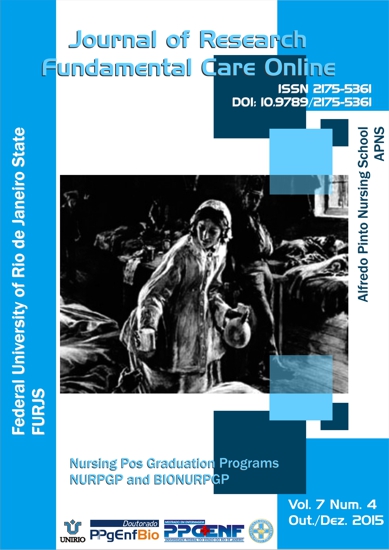Alarm of monitoring invasive of blood pressure: are we giving the attention required?
DOI:
https://doi.org/10.9789/2175-5361.2015.v7i4.3418-3429Keywords:
Alarmes clínicos, Fadiga, Segurança do pacienteAbstract
O elevado número de alarmes sem relevância nas UTIs podem resultar em um retardo no tempo de reposta a alarmes relevantes. Objetivos: Identificar porque soam os alarmes de pressão arterial invasiva (PAI) e o tempo de resposta da equipe, descrever as condutas estabelecidas para saná-los. Métodos: Pesquisa descritiva de abordagem quanti/qualitativa. A observação ocorreu em uma UTI adulto de um hospital militar no Rio de Janeiro. Foi aprovada pelo Comitê de Ética em Pesquisa da Universidade Federal do Estado do Rio de Janeiro (CAAE 03284612.4.3001.5250). Considerou-se fatigados alarmes não atendidos em 10 minutos, ou que paravam de soar antes de terem sidos atendidos. Resultados: Registraram-se 76 alarmes de PAI; 21 (28%) foram atendidos, em média em 2,45 min. 55 (72%) alarmes foram considerados fatigados. Conclusão: O elevado número de alarmes fatigados representam risco. É um desafio responder a todos os alarmes considerando a relação enfermeiro/ paciente imposta pela ANVISA.
Downloads
Published
How to Cite
Issue
Section
License
TRANSFER AGREEMENT COPYRIGHT I transfer copyright of the article to the Journal of Care Survey is Fundamental - Online - RPCF, so it is accepted due to electronic publishing. The copyright includes the right to reproduce in whole or in part by any means, distributing that article, including figures, photographs, and any translations. The author can also print and distribute copies of your article, stating that since the rights belong to RPCF. I declare that this manuscript is original and has not been submitted for publication, in whole or in part to other online journals or not, so BMMC in the Annals of scientific events or book chapters.






























